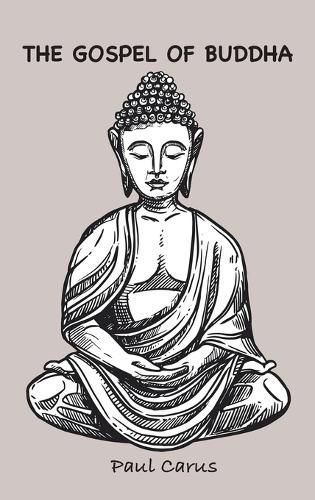Readings Newsletter
Become a Readings Member to make your shopping experience even easier.
Sign in or sign up for free!
You’re not far away from qualifying for FREE standard shipping within Australia
You’ve qualified for FREE standard shipping within Australia
The cart is loading…






This title is printed to order. This book may have been self-published. If so, we cannot guarantee the quality of the content. In the main most books will have gone through the editing process however some may not. We therefore suggest that you be aware of this before ordering this book. If in doubt check either the author or publisher’s details as we are unable to accept any returns unless they are faulty. Please contact us if you have any questions.
The Gospel of Buddha is an 1894 book by Paul Carus. It is modeled on the New Testament and tells the story of Buddha through parables. It was an important tool in introducing Buddhism to the west and is used as a teaching tool by some Asian sects.
Carus believed that the modern world required a new Religion of Science. By the 1890s, inspired by the meetings and conversations at the Parliament of the World's Religions in 1893, he had decided that Buddhism was the closest faith to his ideal and created The Gospel of Buddha to popularize the religion in the West.
The work was assembled from existing English translations of Buddhists texts, with significant amendments and reworkings. His selection of texts favoured Buddhism as a philosophy without any supernatural elements. While criticized by contemporary scholars, this interpretation proved popular in the West, leading to a number of reprintings. It also influenced the development of Modern Buddhism in the 18th century in East Asia, notably in a Japanese translation of the book by D. T. Suzuki.
For years afterwards, Carus was a strong sympathizer of Buddhist ideas, but stopped short of committing fully to this, or any other, religion. Instead, he ceaselessly promoted his own rational concept which he called the "Religion of Science." Carus had a selective approach and he believed that religions evolve over time. After a battle for survival, he expected a "cosmic religion of universal truth" to emerge from the ashes of traditional beliefs.
$9.00 standard shipping within Australia
FREE standard shipping within Australia for orders over $100.00
Express & International shipping calculated at checkout
Stock availability can be subject to change without notice. We recommend calling the shop or contacting our online team to check availability of low stock items. Please see our Shopping Online page for more details.
This title is printed to order. This book may have been self-published. If so, we cannot guarantee the quality of the content. In the main most books will have gone through the editing process however some may not. We therefore suggest that you be aware of this before ordering this book. If in doubt check either the author or publisher’s details as we are unable to accept any returns unless they are faulty. Please contact us if you have any questions.
The Gospel of Buddha is an 1894 book by Paul Carus. It is modeled on the New Testament and tells the story of Buddha through parables. It was an important tool in introducing Buddhism to the west and is used as a teaching tool by some Asian sects.
Carus believed that the modern world required a new Religion of Science. By the 1890s, inspired by the meetings and conversations at the Parliament of the World's Religions in 1893, he had decided that Buddhism was the closest faith to his ideal and created The Gospel of Buddha to popularize the religion in the West.
The work was assembled from existing English translations of Buddhists texts, with significant amendments and reworkings. His selection of texts favoured Buddhism as a philosophy without any supernatural elements. While criticized by contemporary scholars, this interpretation proved popular in the West, leading to a number of reprintings. It also influenced the development of Modern Buddhism in the 18th century in East Asia, notably in a Japanese translation of the book by D. T. Suzuki.
For years afterwards, Carus was a strong sympathizer of Buddhist ideas, but stopped short of committing fully to this, or any other, religion. Instead, he ceaselessly promoted his own rational concept which he called the "Religion of Science." Carus had a selective approach and he believed that religions evolve over time. After a battle for survival, he expected a "cosmic religion of universal truth" to emerge from the ashes of traditional beliefs.